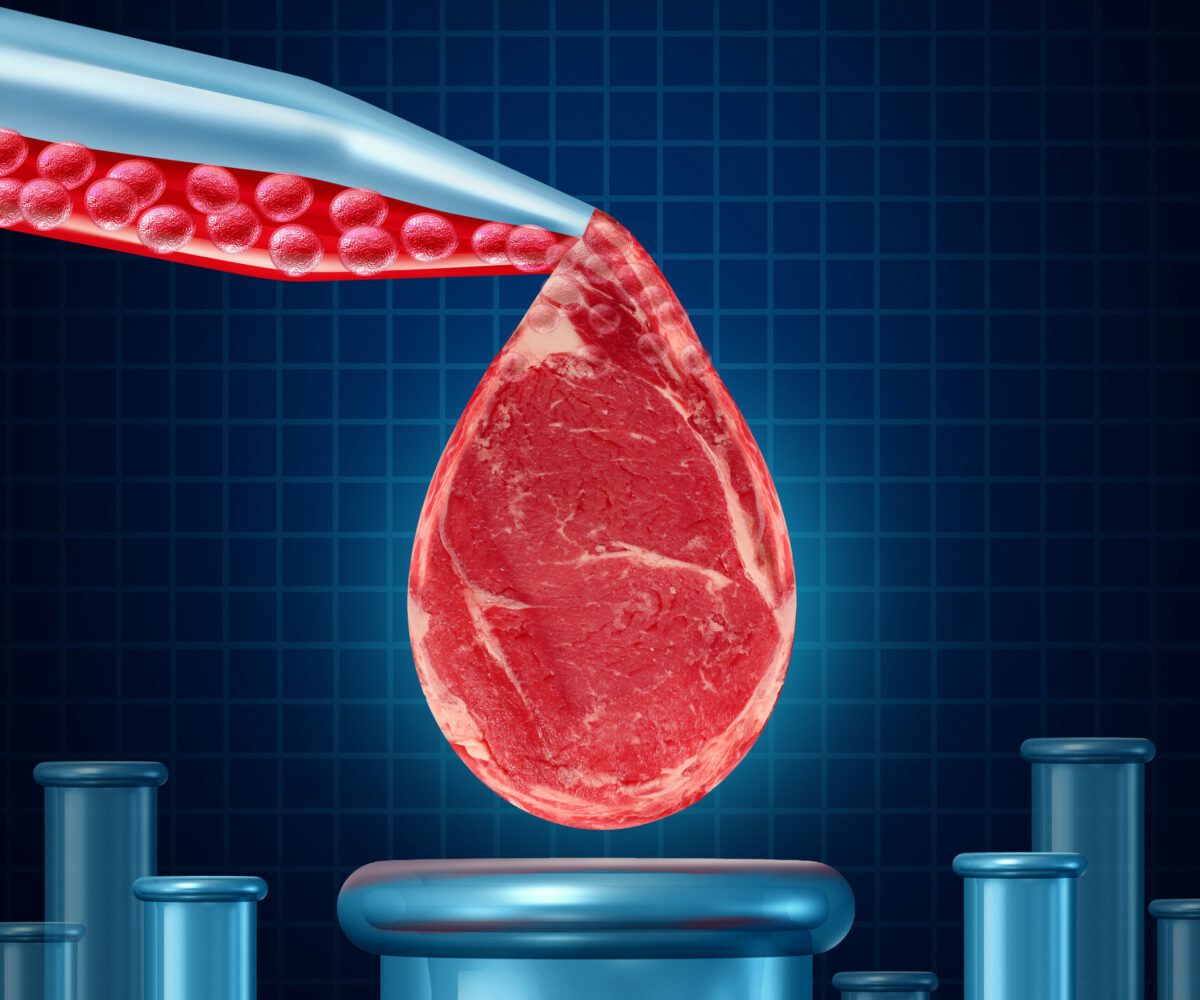Time’s up: reaching ‘peak meat’ and shifting to plant-based is no longer an option, but a need

For many years, I consciously chose veggie dishes from restaurant menus and avoided buying cheap supermarket meat. I ate ‘minimal meat’ for environmental reasons. But it was only when I spent a stomach-wrenching four hours observing a porpoise post-mortem that I resolved to stop eating animals completely. My point is, this was not a rational decision. I felt physically and emotionally compelled. And crucially, my personal transition from carnivore to flexitarian to vegetarian took time. But right now, speed is of the essence – we’ve not yet reached ‘peak meat’, but it’s clear that swapping animal products for plant-based ones is more important than ever.
A scientifically-formulated ‘planetary health diet’ proposed by the EAT-Lancet Commission aims to tackle the unhealthy overconsumption of meat in Western diets and create a more sustainable food system by 2050, in part by halving consumption of foods such as red meat. So how is the protein transition unfolding on a global scale?
The importance of reaching ‘peak meat’
Already, 80 billion animals are slaughtered each year for their meat and, troublingly we haven’t yet reached ‘peak meat’, the point at which the world sees a downturn in overall consumption. The world now produces more than three times the quantity of meat as it did 50 years ago. In 2018, production was around 340 million tonnes, according to Our World in Data. As the world gets richer, meat consumption tends to increase.
Livestock takes up nearly 80% of agricultural land worldwide, but produces less than 20% of the world’s calories. Producing animal protein within today’s industrialised agricultural systems is not only inefficient, it’s detrimental, causing Amazon deforestation, excessive chemical inputs, enormous greenhouse gas emissions from livestock and vast water consumption.
A huge reduction in meat eating is essential to avoid climate breakdown, with beef consumption needing to drop by a hefty 90% in western countries, and be replaced by five times more beans and pulses. Scientists at the Oxford Martin Programme on the Future of Food highlight that a global shift to a flexitarian diet is required to keep climate change below 2°C, let alone 1.5°C.
Lead researcher Dr Marco Springmann told BBC Radio 4’s Inside Science recently: “changes to more plant-based diets could massively reduce the food-related emissions footprint on a per person level.” According to Springmann, “a shift to flexitarian diets could halve someone’s food-related emissions and a shift towards vegetarian and vegan diets reduce food-related emissions by two-thirds to three-quarters.”
Tracking meat consumption
“Assessing meat reduction is crucial because it allows us to track progress toward environmental goals,” says Dr Chris Bryant, a social scientist who studies this ‘protein transition’ at the University of Bath. One of the most common ways to measure meat reduction is by assessing per capita meat consumption. Research by nutrition and health behaviour expert Cristina Stewart and her University of Oxford colleagues in 2021 found that daily meat consumption per person decreased between 2008 and 2019, but meat intake increased over time among people born after 1999. “Overall, meat consumption has increased due to population growth,” explains Bryant, “and a shift in consumption patterns has been observed, with a decline in red meat consumption and an increase in poultry consumption.”
At a population level, it’s important to distinguish between people’s desire to eat less meat and their actual dietary patterns. According to recent market research by Mintel, only one in 10 Brits are non-meat eaters, while less than 2% of Brits say they follow a vegan or plant-based diet, despite 41% of Brits believing that reducing meat consumption is better for the environment. Recent studies by the World Resources Institute found that despite ranking environmentally-friendly diets as a priority, young consumers seem to be buying more meat-based products than over 65s in the UK.
“If we are to avoid environmental disaster, policymakers must grab the plant-based bull by the horns and reduce meat consumption fast.”
Philip Lymbery, Global CEO, Compassion in World Farming
Norway has relatively low meat consumption, while Canada, New Zealand, and Switzerland may have reduced meat consumption for environmental and ethical reasons. In Denmark, traditionally a meat-loving country, the intention to reduce meat intake is gradually increasing with specialised campaigns that promote a combination of meatless veggie days as well as eating smaller portions of meat or less but more sustainably-produced meat.
But even within one nation, there are nuances. In a study published in Plos One, Italian researchers confirmed that strategies should vary between regions, because people living in the north tend to eat more processed and red meat. “Strategies to empower citizens to make dietary changes could be improved in Italy by accounting for local differences,” they concluded, emphasising the importance of considering gender and socioeconomic status, rather than taking a one-size-fits-all approach.
Meat consumption is particularly high in China, Brazil, North America and Australia, but countries including the UK, Germany and the Netherlands are beginning to cut down meat through a mix of policies, investment in alternative proteins and consumer messaging strategies.
Bryant points out that Germany is one of the few countries to seriously consider implementing a meat tax. “Research in 2020 showed that fewer than half of Germans identified as meat-eaters, with many embracing flexitarian or meat-reducing diets,” he explains, while Haarlem, a city in the Netherlands, took a notable step by banning the advertising of meat products in September 2022. “This reflects a growing awareness of the environmental and ethical implications of meat consumption.”
Political action is urgently required to address this problem, yet most governments are frustratingly slow to legislate. In the UK’s National Food Strategy, former food tsar Henry Dimbleby suggested that a 30% meat reduction over 10 years would be required for land to be used sustainably in England, but that has largely been ignored by government.
A shift towards plant-based proteins
Food awareness organisation ProVeg International focuses on the benefits of plant-based foods, rather than the negative consequences of meat and dairy sectors. The organisation aims to drive change through working with institutions (in public sector catering for schools, hospitals, universities), policy (from local governments right up to the UN level) and business (supporting pioneering plant-based start-ups).
The ProVeg philosophy is ‘progress over perfection’ explains Jimmy Pierson, ProVeg UK Director, who has helped turn more than 8 million school meals meat-free or plant-based since 2018. “We’ll welcome and encourage every small step in this direction, however small, whoever it is by.” Pierson works with 41 major school caterers, including 31 local authorities. “So by influencing just one person at the council, we can change the menu in hundreds of schools in one go. We also want to change the dietary habits of this generation and future generations, so we really think this intervention in schools is crucial.”
Bryant explains that ’push’ factors – such as awareness of animal welfare and emissions of intensive agriculture – are as important as ‘pull’ factors that entice people to make the switch. Any strategy needs to suit the audience too: “It is essential to tailor messaging to resonate with different individuals, as people have diverse motivations for reducing meat consumption. By addressing environmental, health, and animal welfare concerns, we can create a holistic approach that leads to a more significant and lasting impact on both population health and the environment.” Bryant adds that when it comes to honest and effective consumer messaging, animal welfare is often the most motivating factor, resulting in the most significant and enduring dietary changes.
Philip Lymbery, Global CEO of Compassion in World Farming and the author of several books, including Sixty Harvests Left: How to Reach a Nature Friendly Future, agrees that linking meat to living animals or to issues of animal welfare issues is a powerful way to trigger negative emotions. He criticises the food industry’s lack of transparency with use of misleading ‘farm fresh’ branding: “If labels on products adorning supermarket shelves were upfront, things would soon be different. Many consumers would recoil in horror knowing their meat comes from disease-ridden factory farms where animals suffer in darkened conditions before an unceremonious end in a slaughterhouse,” says Lymbery who encourages people to eat less but better, higher welfare meat from regenerative, pasture-fed, free-range or organic farming.
Currently, public awareness of the link between meat consumption and climate change is low and experts say that the media – across multiple platforms – plays a major role in making this connection much more relatable and tangible in order to inspire action. A partial replacement of meat with plant-based meat alternatives may enable consumers to become more willing to adapt their dietary patterns, but for different reasons. Researchers from Northumbria University concluded that some might react to nutritional benefits or competitive pricing of meat-free alternatives, others might want to reduce their carbon footprints, while ethically-minded organic shoppers might have animal welfare concerns.
Hunger for change
Business in plant-based protein alternatives is booming, especially in the US and Israel. The recently published Good Food Institute analysis of 13 European countries, including the UK, shows that sales of plant-based foods grew by 22% between 2020 and 2022, reaching a record €5.7 billion, with the German plant-based food retail market being the largest in Europe.
Lymbery has noticed various pioneering corporates starting to set targets. Compass Group, a hospitality company that operates in 40 countries, has committed to reduce meat use by 40% by 2030. With more than 680 million customers eating at its bistros, food markets and restaurants, IKEA, famed for its Swedish meatballs, has pledged to make half its meals plant-based by 2025. In Germany, the budget supermarket Aldi will expand its vegan range from 700 to 1000 products and cut back on some meat and dairy lines by the end of 2024, while Lidl will also reduce animal-based products ‘due to environmental concern’.
“If plant-based alternatives are competitive with animal products on taste, price and availability, you’re going to reach the kind of tipping point that everyone in this sector is looking for when they will be a real acceleration,” says Pierson, who agrees that business has enormous potential to drive change. Through ProVeg Incubator, a 12-week accelerator programme, plant-based start-ups receive expert mentoring, funding and networking with retailers, investors and scientists. “We really foster that innovation and that’s amazing,” he says.
According to Lymbery, the global meat market will be revolutionised by cultivated meat – produced from stem cells taken from donor animals without harming them then grown in a bioreactor: “It has become a multi-billion-dollar industry …and has moved beyond the realms of fantasy to something catching the attention of policymakers,” he says, explaining that cultivated meat promises a much lower impact on climate, land use and air pollution. “Latest predictions suggest cultivated meat could secure 10% of the meat market by 2030 and as much as 35% by 2040. With time so short and current meat production such a major driver of planetary emergencies, cultivated meat could be the game-changer.”
From encouraging retailers to reduce meat shelf space to improving animal welfare standards, so many different mechanisms can drive meat reduction, according to Bryant. “Scaling up these best practices requires collaboration between governments, industry, and consumers,” he says. “By sharing successful strategies and investing in innovation, we can create a global shift towards more sustainable and ethical food systems.”
Lymbery appeals for ‘concerted action’ from decision-makers in governments, the UN and leading corporations in order to reach ‘peak meat’: “If we are to avoid environmental disaster, policymakers must grab the plant-based bull by the horns and reduce meat consumption fast.”








